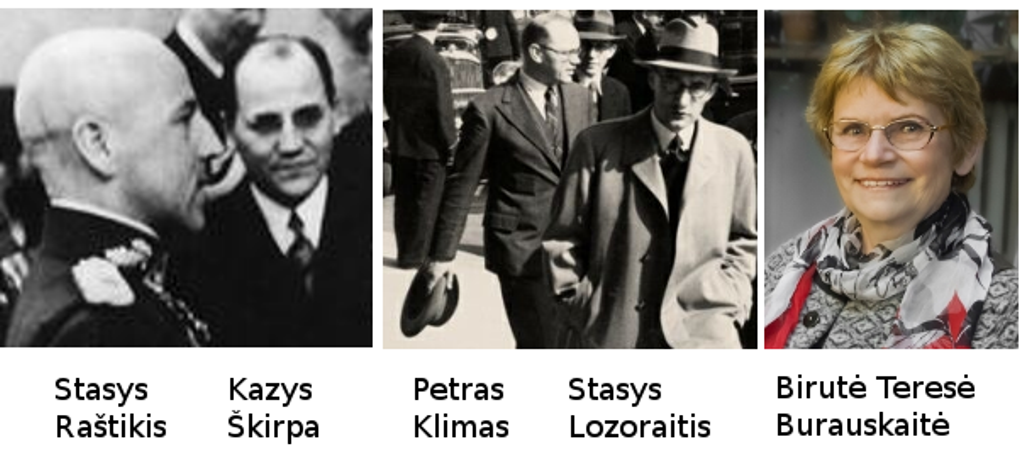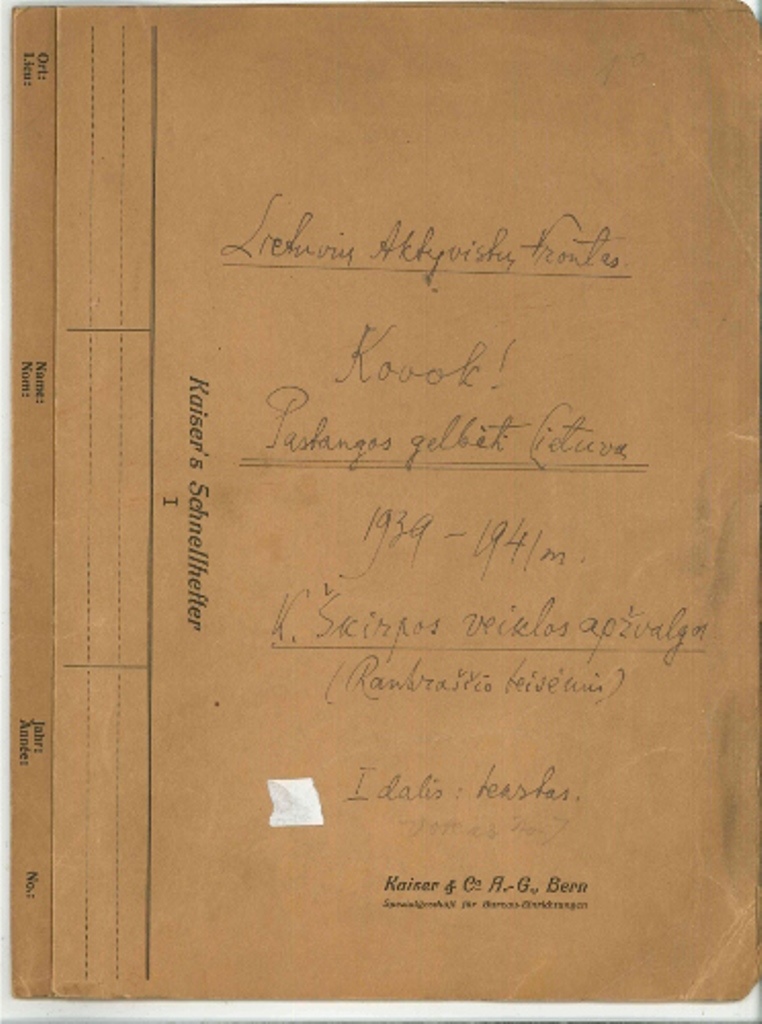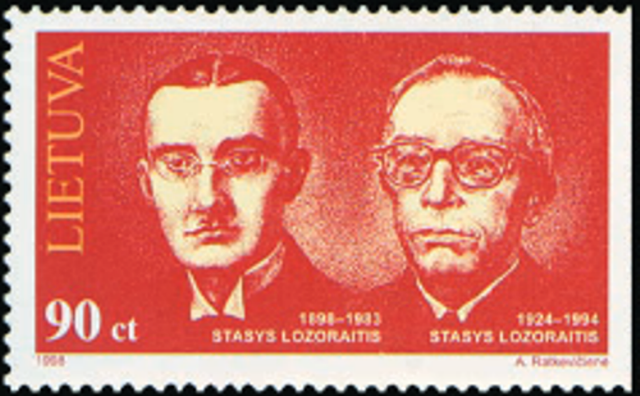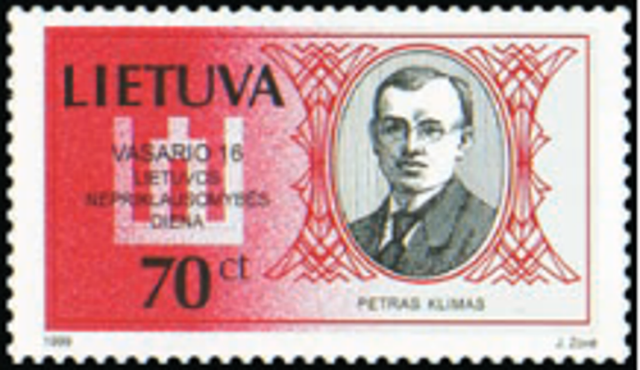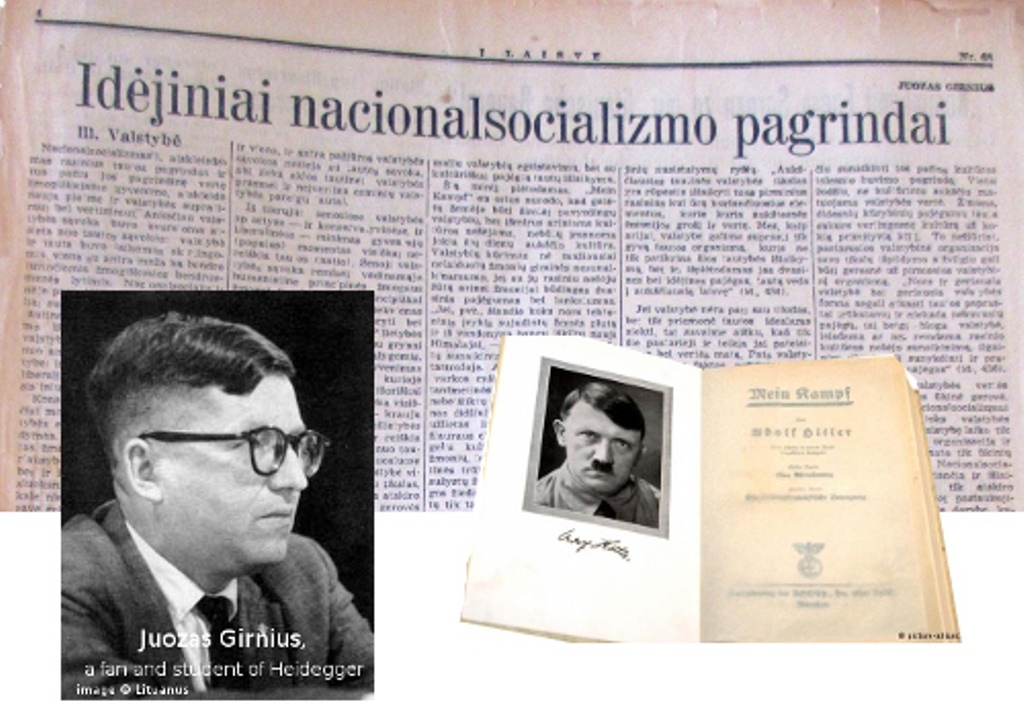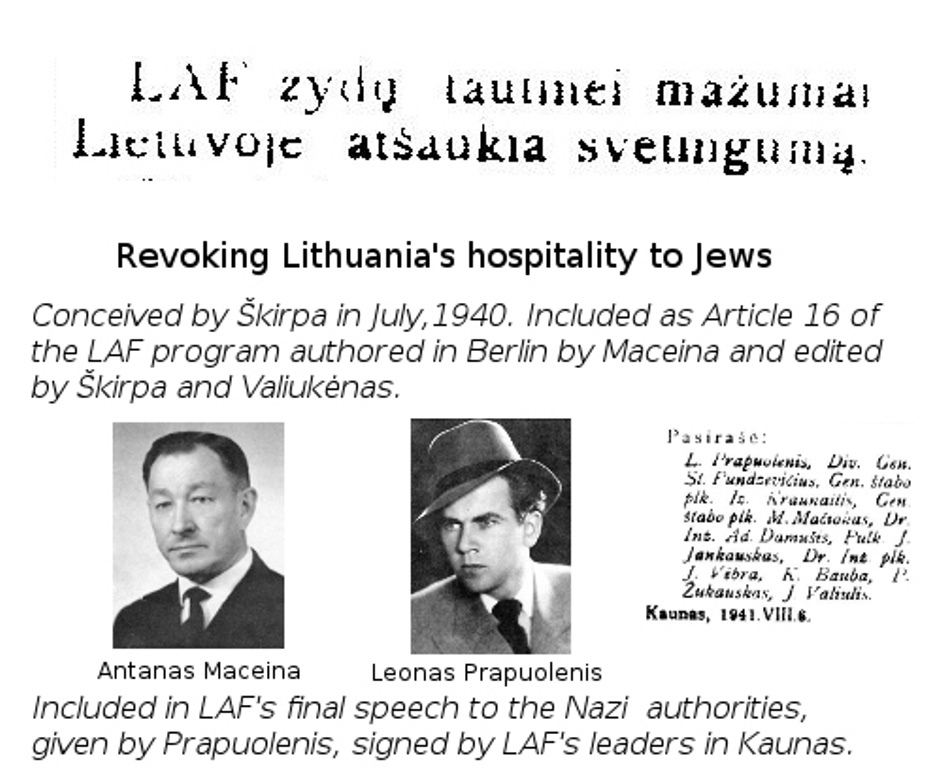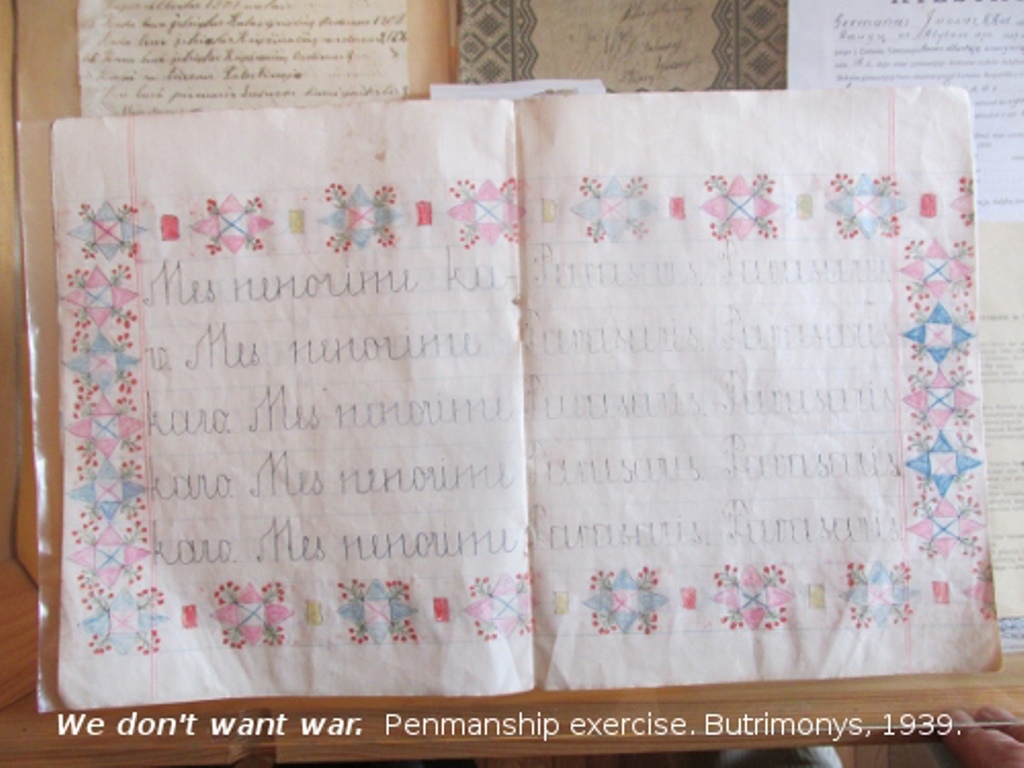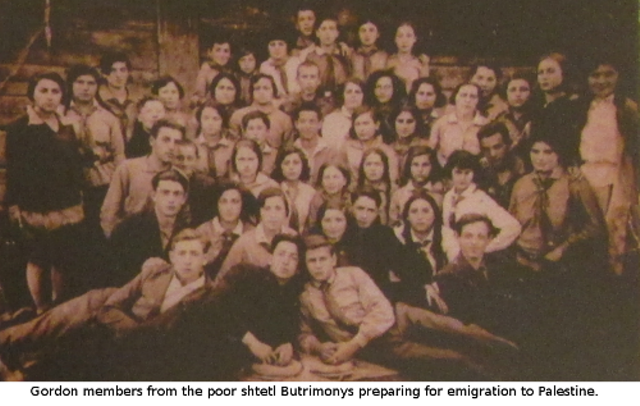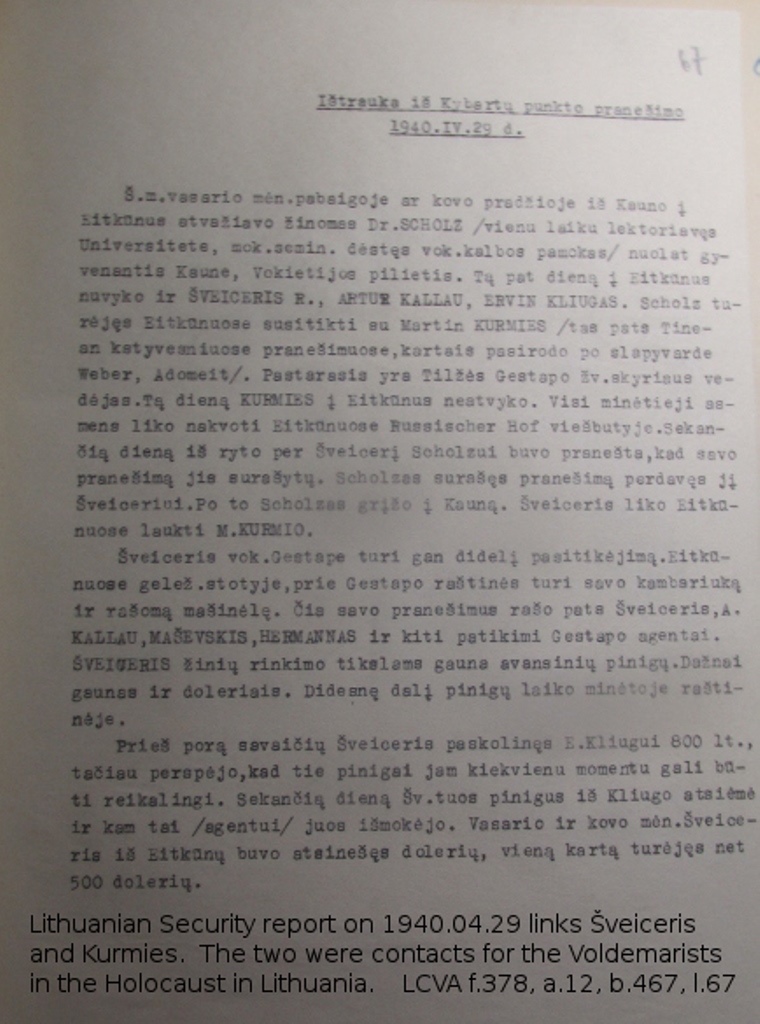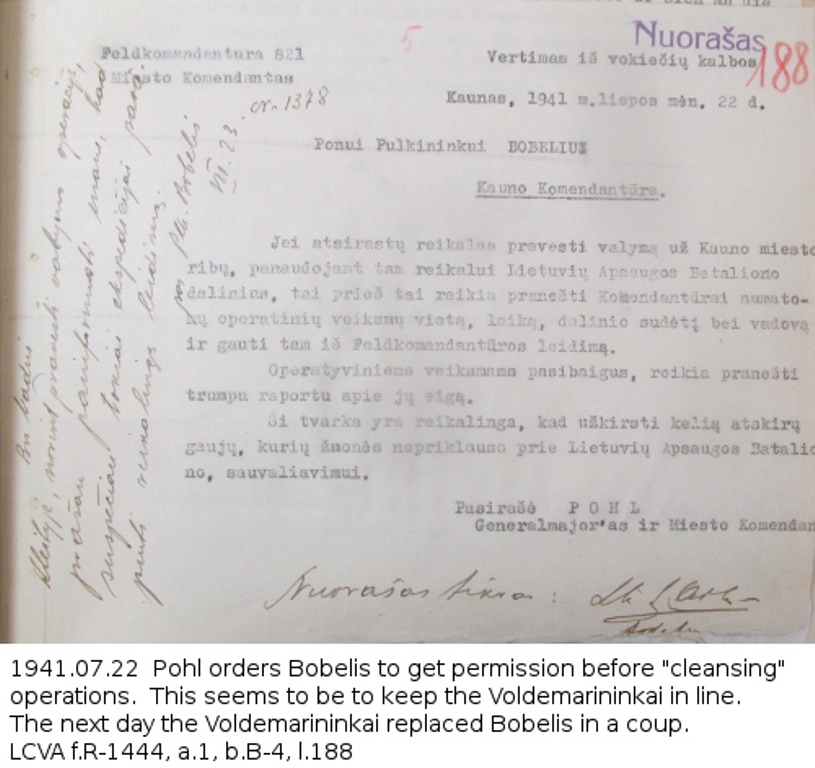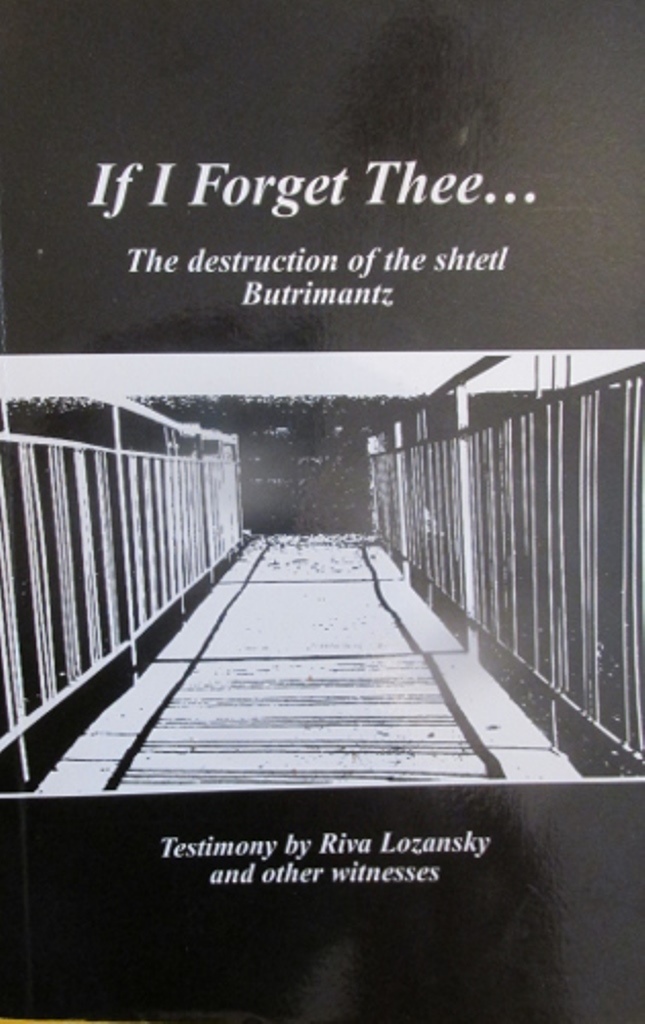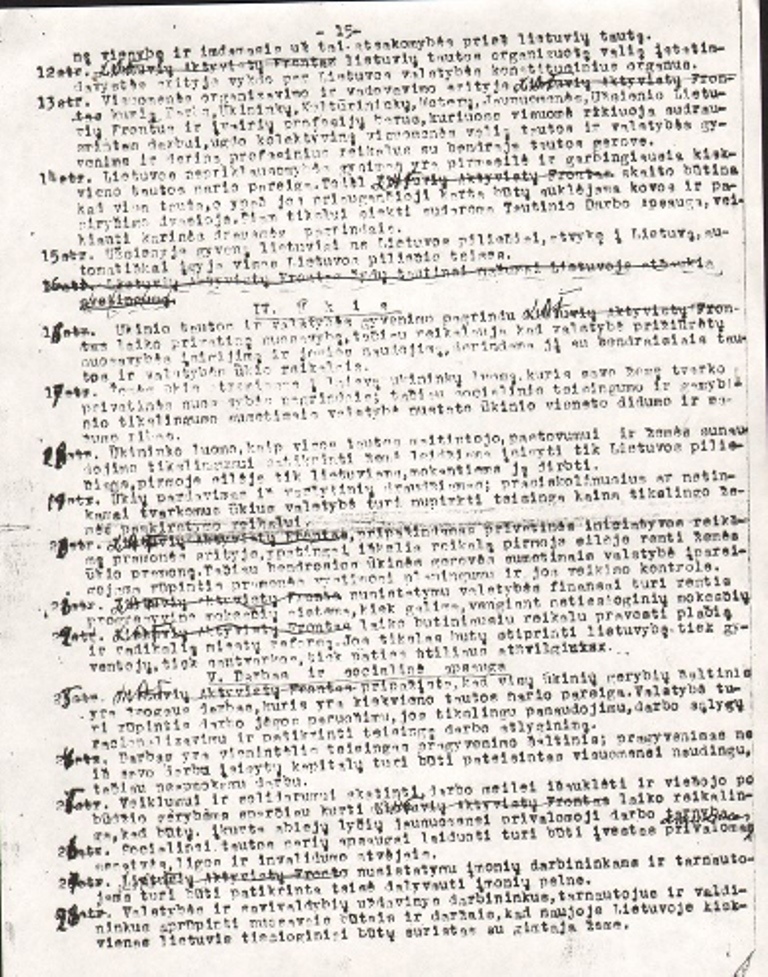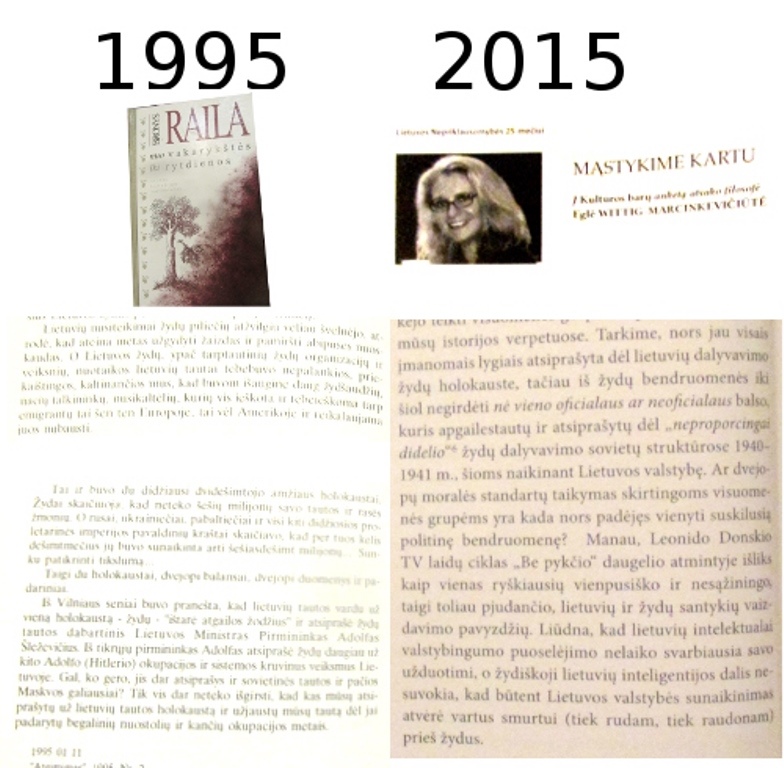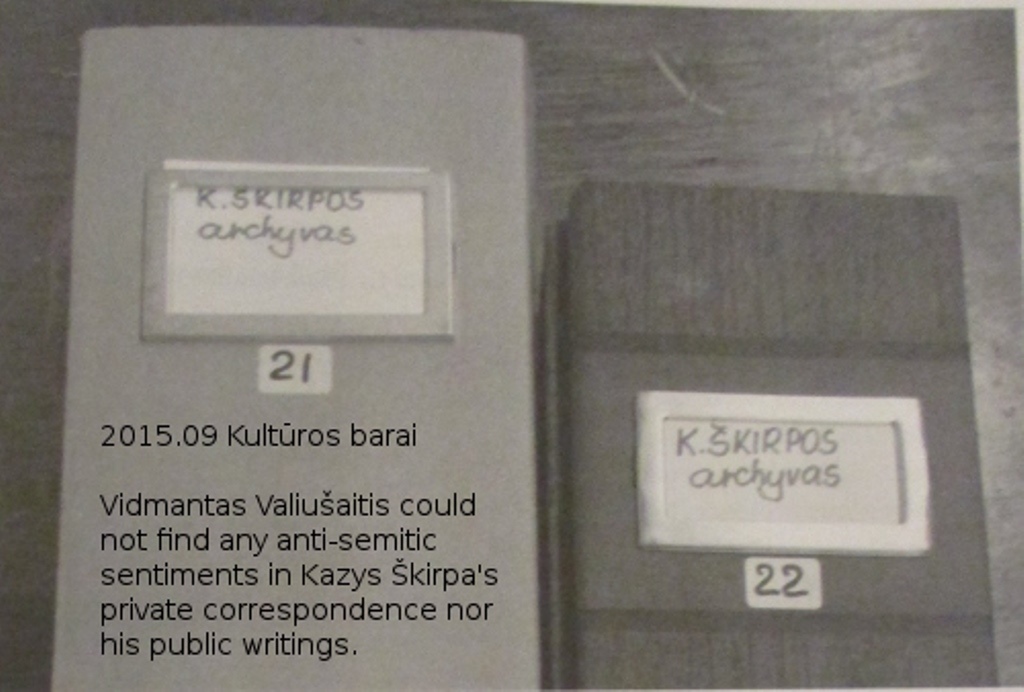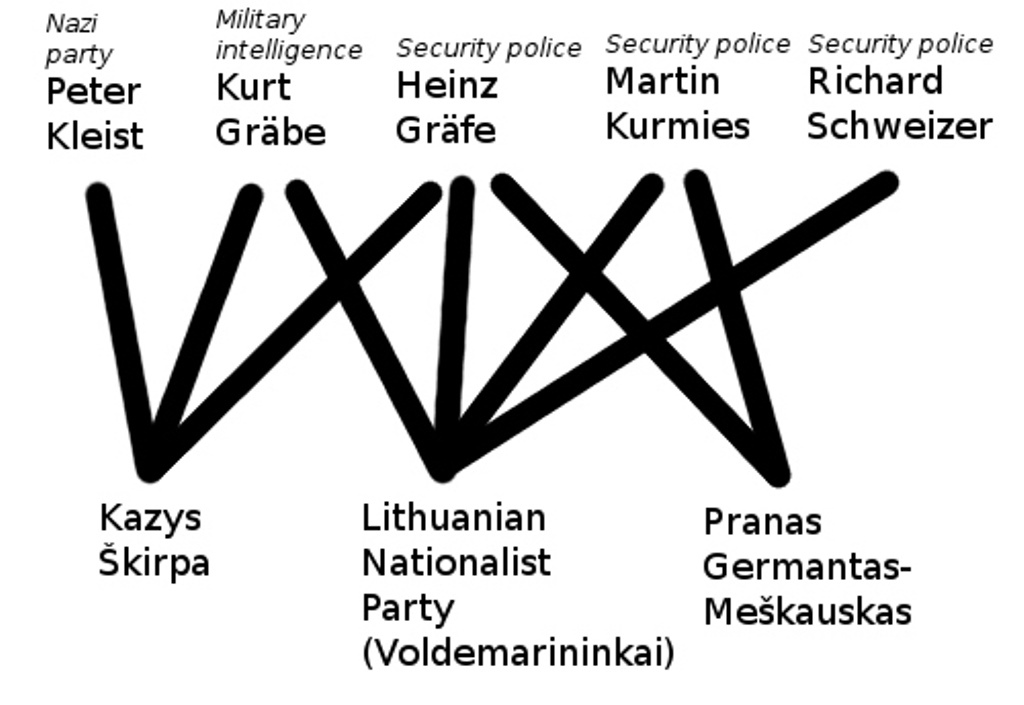O P I N I O N / H I S T O R Y
◊
2023 update: Readers experiencing difficulty accessing sources linked are referred to the archived version where original links are operative.
◊
by Andrius Kulikauskas
◊
◊
As of October 28, 2015, the home page of the Genocide and Resistance Research Center of Lithuania has a link to an authorative statement by General Director Birutė Teresė Burauskaitė about Kazys Škirpa. She responds to a request for information by the City of Kaunas, which has a street in Škirpa’s name. Škirpa was Lithuania’s representative in Berlin, the leader of the Lithuanian Activist Front, organizer of Lithuania’s anti-Soviet rebellion and Prime Minister of Lithuania’s Provisional Government in 1941. In bold letters she emphasizes:
Having analyzed the antisemitic statements in the texts prepared by LAF-in-Berlin, it is possible to assert that its members proposed to solve “the Jewish problem” not by genocide, but by the method of expulsion from Lithuania.
She accepts the fact that Kazys Škirpa, Bronys Raila and others proposed (in fact, advanced) ethnic cleansing of Jews from Lithuania. In her conclusion, she notes:
Škirpa and the organization which he led can be criticized in that the organizational activity of LAF-in-Berlin elevated antisemitism to a political level and that could have encouraged a portion of Lithuania’s residents to get involved in the Holocaust. On the other hand it must be noted that LAF-in-Berlin proposed to solve “the Jewish problem” not by genocide but by the method of expulsion from Lithuania.
She is defending ethnic cleansing, a crime against humanity!
My first impulse was to write this letter why she should be fired. I thought twice and first sent her this letter in Lithuanian with 12 questions. I included a link to my work-in-progress on an article that I have been writing about documents in which Kazys Škirpa promotes ethnic cleansing, as well as letters by Stasys Lozoraitis and Petras Klimas in support of ethnic cleansing.
I didn’t hear from her so I called her a week later. She kindly gave me short answers to my questions. It seems that she didn’t write the statement herself. She thinks of herself as an administrator, not a historian. It was not her intent to defend or evaluate Kazys Škirpa but simply to provide a historical certificate. She was sympathetic to each and every one who had ever suffered wrong. However, she did not like the charges of antisemitism leveled against the Center. As regards the Soviet occupation of Lithuania, she had often stated that it was not a genocide but rather had genocidal aspects. The Genocide and Resistance Research Center was going to organize an inclusive conference in the first quarter of 2016 on the controversial issues.
She was not aware of the Lithuanian documents promoting ethnic cleansing which I had uncovered. Would the Center’s website publish such documents? Yes, she said, after review by historians. She agreed that I work on that with Arūnas Bubnys, the Center’s Director of Genocide and Resistance Research Department. Arūnas arranged for us to meet at her office on Monday, December 7. I would prepare for him beforehand a list of documents to publish. I alerted him that in the meanwhile I was preparing an article for the Defending History website to make available as soon as possible the documents I have collected.
I have uploaded a video of the first hour of our conversation.
Subsequently, Teresė wrote:
I will take to reading authentic documents and consulting with our computer specialists how the Center’s website might present your article with links to documents which could be opened and read and copied. I just want to note that you are mistaken – in no documents, which I have signed, is there an approval of ethnic cleansing.
I recommend my overview How Did Lithuanians Wrong Litvaks? for general background on conspiracies by the Voldemarists to commit genocide against Lithuania’s Jews and by Kazys Škirpa and the Lithuanian Activist Front to organize ethnic cleansing.
◊
1The most important document to publish is Kazys Škirpa’s original 273 page memoir “Kovok! Pastangos gelbėti Lietuvą” (Fight! Efforts to Rescue Lithuania) (19 MB) from 1943 with an Annex of 110 accompanying documents. (32 MB) I purchased a digital copy at Lithuania’s Central State Archive (LCVA). See especially:
◊
- Document 34, shown to Nazi strategist Peter Kleist on July 13, 1940, where Škirpa first promotes ethnic cleansing.
- Document 35, shown to Peter Kleist on July 22, 1940, where Škirpa names and describes the Lithuanian Activist Front.
- Document 37, the letter from Jonas Pyragius and the Voldemarists to Škirpa on August 23, 1940, which refers to their suggestions to SD officer Heinz Graefe.
- Document 62, a rewrite in German by general Stasys Raštikis of Škirpa’s “Instructions for Liberating Lithuania” (Document 58), submitted in early May, 1941 in a meeting in Koenigsberg with Klemensas Brunius, Kurt Graebe and officers of the German military high command (OKW). Both documents emphasize the importance of forcing all Jews to flee Lithuania. (See memoir page 133).
- Document 55, directed specifically to Jews, as Škirpa writes on page 136 in his memoir:
The plan for Lithuania’s liberation (see Document XLIV) had foreseen apart from preparing the uprising itself to also develop a wider secret propaganda in occupied Lithuania to spiritually foster the nation for this fateful campaign. But work in preparing the uprising soon showed that this was completely unnecessary: our nation was made ready for the said fateful campaign by the Soviet Soviet system itself and the inhuman terror of the occupier and its Jewish collaborators. Contrarily, LAF Leadership on occasion received requests from Lithuania not to send any secret literature to the country. Therefore we refrained from this. The LAF Leadership distributed in the country only the bulletin “From Bolshevik Slavery to New Lithuania” made up of the protests of Lithuania’s emissaries. Aside from that, a few weeks before the start of the Russian-German war there was released a proclamation directed specifically to the Jews. This was done to warn them in advance that they will have no life in the New Lithuania. In this way it was desired to warn the Jews that it would be best for the sake of saving their own lives to withdraw from Lithuania in advance or at least along with the Russian Red Army. About 500 copies of this proclamation were released and it was distributed only in the border region. A copy of it is appended here (See Document LXIV). [Actually: Document LV]
My unfinished article in English includes an extensive history of this memoir, an overview of its contents, discussion of related documents, and translations of excerpts. The Library of the Academy of Sciences has a cover letter from Škirpa to Ambrazevičius in December, 1942, which accompanied about 20 of the documents, among them Nr.34 and Nr.35, with Škirpa’s handwritten notes as to which Nazis he gave them to.
◊
2Correspondence amongst Lithuania’s ambassadors in 1940-1941. (73 MB) I purchased digital copies at LCVA. Note, in particular, their discussion of Document 55, where Lithuania’s top two diplomats Stasys Lozoraitis and Petras Klimas write in favor of ethnic cleansing and worse.
As regards the Jewish proclamation, let it proceed. If, after locking up 3 million Lithuanians in prison, some innocent Jews will also suffer, there isn’t going to be any earthquake, the world won’t collapse. And it will be naplevat [Russian: “spit on it”] as to that world’s odium! And how, naplevat, will, for example, you, who has lost your diplomatic immunity, inquire upon your Hungarian colleague, who has not lost it. (May 10, 1941. LCVA f.668, a.1, v.734, l.199)
The drafts of the proclamations are all good, except that the language should be corrected and smoothed out, because it’s awkward to appeal to the nation with lame expressions. I’m not even shocked by the warning to the Jews, because those parasites showed what they ever were even in such a country as Lithuania, where nobody hindered them from living nor organized pogroms. If amongst Jews there are good citizens, then all the same even these good citizens gave birth to russophiles and dreamed about the Russian empire. Jews could live amongst us out of the way, but they took to want to butt into our life, so let them know that they have become our enemies and pests. There is no antisemitism in this, but just a defense mechanism against an element which uses a foreign power to do its parasitic selfish bacchanal deeds. That is the ugliest form of abuse of the rights of asylum. However, we need to delete the phrase that Vytautas invited them, for he did not invite them, but merely let those who were driven out of Germany settle amongst us under certain conditions. Today they are not meeting those conditions and too bad for them! In that for this may suffer many who are completely innocent, there is nothing you can do: can those innocents guarantee that they won’t give birth to Russian brats and all kinds of Communist scoundrels? As they have once mistreated us so, it needs be that there not be such a seed in Lithuania at all. Half measures here will only let there arise amongst them liars and hypocrites who will just weasel there way out. After this experiment, the Jews must be thrown out of Lithuania’s life because they declared their war on us rather than stay out of the way during this time of our misfortune. The Jews did not show such despicable behavior in Germany nor in any other country. Thus in Lithuania they merited much more severe sanctions than elsewhere. And that should not be hidden. Has it ever been seen anywhere in Germany that a Jew would sit on an arrested priest and thus make fun of the entire Lithuanian nation? Was it ever in Germany that Jews would act as Commissars and spread their Russianness as they do amongst us? Is that how they understand our asylum? From this I conclude that the tone and theses of the proclamation are too gentle. But that does not mean that such a proclamation is actually necessary. It would be better not to publish it, but when the hour comes to carry everything out one hundred times more severely. I prefer actions. (May 12, 1941. LCVA f.MK-9, a.1, v.2, l.499-501)
Petras Klimas’s murderous words stand in stark contrast to his letter to Lithuania’s Foreign Ministry on April 12, 1940 where he urges Lithuania to court Jews with a vision of Vilnius as the Jerusalem of Lithuania. Read also:
First of all the most beautiful greetings for the New Year: may all of our bright hopes be fulfilled and may the sword of justice fall with all its might on the heads of our oppressors-Russkies [kacapai] and sweep out of our Parentland not only aliens but also our own traitors and especially the Jewish trash which harrows and oppresses Lithuanians. And your firm faith in the future, which strengthens us all, may it realize itself by fire and sword… (LCVA f.MK-9, a.1, b.11, l.78)
- Škirpa’s letter to Žadeikis on April 15, 1941 disclosing LAF’s expenses (LCVA f.MK-9, a.1, b.6, l.108-111). Škirpa emphasizes he has not taken money from the Germans in any form so as to stay independent.
Letters from the LCVA should be merged with a selection from the collection recently published by the VMU Lithuanian Emigration Institute, “Lietuvos diplomatų korespondencija (1940-1945 m.)” The correspondence of Jurgis Šaulys in Lugano, Switzerland with Povilas Žadeikis in Washington D.C. should be searched for any criticism of plans for ethnic cleansing.
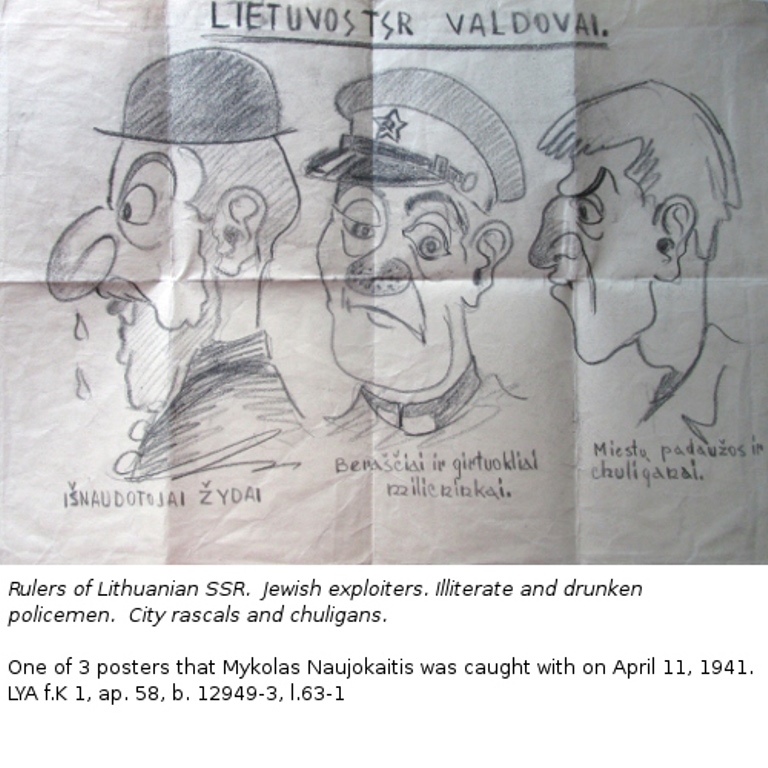 3Lietuvos Ypatingasis Archyvas (Lithuanian Special Archive) has Soviet criminal files on dozens of Voldemarists and LAF members whom they imprisoned. The archive has granted me permission as I requested to publish online files of Algirdas Sliesoraitis, Algirdas Voldemaras, Antanas Valiukėnas, Augustas Voldemaras, Emil Just, Ignas Vylius, Jonas Karutis, Juozas Pajaujis, Kazys Germanas, Klemensas Brunius, Mykolas Naujokaitis, Stasys Kviecinskas, Vytautas Mačiuika and Zenonas Blynas. At this time I share:
3Lietuvos Ypatingasis Archyvas (Lithuanian Special Archive) has Soviet criminal files on dozens of Voldemarists and LAF members whom they imprisoned. The archive has granted me permission as I requested to publish online files of Algirdas Sliesoraitis, Algirdas Voldemaras, Antanas Valiukėnas, Augustas Voldemaras, Emil Just, Ignas Vylius, Jonas Karutis, Juozas Pajaujis, Kazys Germanas, Klemensas Brunius, Mykolas Naujokaitis, Stasys Kviecinskas, Vytautas Mačiuika and Zenonas Blynas. At this time I share:
◊
- the LAF proclamations which Mykolas Naujokaitis was caught with (18 MB)
- Klemensas Brunius’s testimony (15 MB)
Other files which should be published and translated include those on Pranas Giedraitis, Ignas Taunys, Jonas Vokietaitis, Juozas Surmas, Leonas Taunys-Kovas, Petras Kubiliūnas, Pranas Matiukas, Vincas Rastenis. Their social network should be exhaustively documented.
Lithuania should work to acquire copies of Petras Kubiliūnas’s file in Moscow.
Of special importance is Pranas Giedraitis’s testimony, as published by KGB agent Boleslovas Baranauskas in his book “Hitlerininkų penktoji kolona Lietuvoje”. Giedraitis describes courses in March 1941 where LAF agents were taught to organize nationalists to kill all of Lithuania’s Jews.
◊
4Lithuanian periodicals during the Nazi-occupation should be made available through www.epaveldas.lt Here is what I have photographed from:
◊
-
Į laisvę (Kaunas) (117 MB). Read the first uncensored issue edited by Juozas Ambrazevičius, Zenonas Ivinskis, Jonas Grinius and Jonas Virbickas. Note also philosopher Juozas Girnius’s article on The Conceptual Foundations of National Socialism (19 MB) starting August 30, 1941. See also articles about the history of Į Laisvę from which it can be deduced that Jesuit high school director Kazys Bauba was the author of antisemitic editorials such as “Cleaning the Lithuanian nation of a fungus” on July 5, 1941, while the Voldemarists were murdering 3,000 Jews and other prisoners at Kaunas VII fort.
- Naujoji Lietuva (Vilnius) (91 MB). Edited by Stasys Žakevičius-Žymantas. The first issue makes no mention of the Provisional Government, nor do later issues. The editorial on 1941.07.04 concludes that the first goal of New Lithuania is to eradicate Jews.
- Tėvynė (Šiauliai) (125 MB). Edited by Simas Miglinas. Published by LAF and then LNP. Published proclamations and editorials that the more heavily censored Į laisvę could not. The editorial on 1941.09.26, “Mercy out of place“, rebukes Lithuanians for tossing food to Bolshevik prisoners-of-war. This adds context to Dalia Noreikaitė’s memory of her mother Antanina Noreikienė baking buns for hungry Jews. Her father Jonas Noreika was the leader of LNP in Žemaitija.
- Išlaisvintas panevėžietis (50 MB). Edited by Petras Balčiūnas. The editorial by V. Trakys on 1941.07.24 advocates getting rid of all Jews.
- Tautos kelias — The Library of the Academy of Sciences has a mockup of the Lithuanian Nationalist Party’s newspaper which the Nazi Germans refused to permit. It includes a genocidal editorial by Vetuvius, that is, Zenonas Blynas.
◊
5I commend the Lithuanian History Institute and Gediminas Rudis for publishing Zenonas Blynas’s diary, which includes the Voldemarininkai’s genocidal program “to delete Jews from life”. It also describes Kazys Šimkus’s party in honor of Karl Jaeger upon completion of his genocidal work, where LNP leader Leonas Virbickas spoke how Lithuanians are used to cleaning house before a great celebration. Blynas’s diary should be made available online for easy searching as has been done for books by Škirpa and Brazaitis by partizanai.org Likewise, memoirs should be republished online by
- Jonas Pyragius (25 MB) — We know him from Blynas’s diary as a champion of genocide.
- Pilypas Narutis (81 MB) — He corroborates that Kaunas LAF asked Škirpa not to send literature. He also relates how the underground student leaders shunned one fraternity leader after he proposed organizing a pogrom against Jews in November, 1940.
- Bronius Aušrotas (33 MB) — He describes the Gleisgarben refugee camp and the LAF / Abwehr network. He gives an insider’s view of the link between LAF and the Abwehr (military intelligence). He links Vytautas Reivytis and Ričardas Šveiceris, two key organizers of the Holocaust in Lithuania. He undercuts the Voldemarininkai claim that the Provisional Government denied them posts and jobs.
- Kazimieras Palčiauskas (25 MB) — He claims he was the mayor for all the people and worked with Jurgis Bobelis to delay the establishment of the Kaunas ghetto.
- Mykolas Naujokaitis (41 MB) — He memorized Kazys Škirpa’s plans but berated them as full of nonsense. Antanas Valiukėnas told him that the Voldemarists were kettle-heads, none of whom should be a minister.
- Bronys Raila (12 MB) — In 1962, Raila explains how he wrote the LAF leaflet to Lithuania’s cultural creatives but Škirpa rejected it as too soft and poetic and authored his own, Document 50. With heavy heart, a few weeks before the invasion, Raila quit his position as the chair of LAF’s propaganda commission on this matter of principle, as he could not be held responsible for such inappropriate form, style and ideas. Whereas he stood by his brochure, Document 70, urging ethnic cleansing.
- Stasys Raštikis — LAF’s minister of defense was very upset that Raila’s Document 70 badmouthed Smetona’s regime but apparently was not disturbed by the goal of ethnic cleansing, which is in his own Document 62. However, further in Volume 2 of his memoirs Kovos dėl Lietuvos (but not in the download) there is an account of how the Provisional Government sent generals Pudzevičius and Rėklaitis, who succeeded in stopping Klimaitis, the organizer of the Vilijampolė pogrom, from organizing any more.
- Tomas Bronius Dirmeikis – He served as a journalist on the LAF propaganda team and later wrote critically of Škirpa. (This collection of his articles is incomplete.)
- Aleksandras Lileikis – He attended the parachutist courses which Pranas Giedraitis described as genocidal.
- Vytautas Reivytis — He demonstrates a sophisticated interest in police ethics, education, control and corruption. He popularized jiu-jitsu in Lithuania with a manual (25 MB) that shows its effect on his thinking. Surely this all served him in organizing the arrest of more than 100,000 Jews.
- Priest Stasys Yla in “Žmonės ir žvėrys” (Humans and beasts) provides psychological portraits of his fellow Lithuanians at the Stuthoff concentration camp. Unbeknownst to him, several were perpetrators of antisemitic crimes against humanity: Pranas Germantas-Meškaukas, Stasys Puodžius, Vytautas Stanevičius, Jonas Noreika, Kazys Bauba.
- Avraham Tory’s diary quotes finance minister Jonas Matulionis that the Lithuanian leadership is divided as to whether to kill off the Jews, punish them in concentration camps or segregate them in ghettos. Tory also describes a bizarre episode where Lithuanians hit Jews at the start of the war, warning them to leave, apparently confirming that the LAF leaflets were effective.
- Archbishop Juozapas Skvireckas’s diary shows his tepid support for Dr. Balys Matulionis’s (Jonas’s brother) and priest Simonas Morkūnas’s efforts to intervene on behalf of the Jews after the Lietūkis garage murders. He documents Bishop Vincentas Brizgys’s reply to the Jews who asked for help: if we tried now to publicly respond on behalf of the Jews, then we might be lynched ourselves [by Lithuanians]. Looking back, could one martyred bishop have made all the difference?
- Leonardas Peseckas documents his role along with Steponas Darius and other air force pilots in the tarring of Jewish signs in 1926 and the overthrow of Lithuania’s democracy.
- Kazys Šimkus broke his silence in Australia to glorify Mother Mary, thanks to whom he escaped unscathed from many accidents, most notably a leap from a height of 10 meters off the wing of a biplane whose engine caught fire. He is best known for leading the TDA battalion which murdered tens of thousands of Jewish children, women and elderly. Many of them he shot with his own pistol.
- Books by Jūratė Vyliūtė (Kapitono Igno byla) and Vytautas Mačiuika (Šiaurės novelės (22 MB), Savi ir svetimi (48 MB)) provide dashing portraits of their fathers and their fathers’ friends, Lithuanian air force pilots, among whom were champions of genocide. Jūratė Vyliūtės book includes the LNP’s inaugural photo with Jonas Jurkūnas’s descriptions of each individual. Vytautas Mačiuika’s stories could make for a movie that would show how the Voldemarists could go so far down a wrong path. By age 17 he had escaped from a concentration camp in Russia and a Soviet prison in Kaunas. He became a sculptor and a poet. He looks like Marlon Brando. He is Lithuania’s Anne Frank.
I provide many quotes from these and other sources here: Citatos and Citatos2.
◊
◊
6The link should be made clear between the LAF program written by Maceina, Škirpa and Valiukėnas in Berlin and the speeches given by LAF leaders in Kaunas.
◊
- Leonas Prapuolenis’s speech to Renteln on August 6, 1941 includes large excerpts from the LAF program including the infamous revoking of hospitality to Lithuania’s Jewish minority. It was signed by the entire LAF-in-Kaunas leadership.
◊
7The discussion in June, 1939 by Joachim von Ribbentrop and Reinhard Heydrich of Nazi Germany about Pranas Germantas-Meškauskas’s request for 100,000 litas to overthrow Lithuania’s government and organize pogroms.
◊
8Antanas Smetona’s memoir from 1940 includes his impressions of Kazys Škirpa and Pranas Germantas-Meškauskas. Also, Smetona’s speech at the Cleveland Jewish Center in 1943 reveals his conspiracy with Lithuania’s leading Jews to facilitate the emigration of poor Jews to Palestine and the retention of wealthy Jews in Lithuania. Both documents are at the VMU Lithuanian Emigration Institute archives.
◊
9Lithuanian security police files (LCVA f.378) from 1938-1940 provide context on:
◊
◊
- Voldemarists and other political parties, see especially LCVA f.378, a.10, b.138 and b.208 and LCVA f.378, a.13, b.82.
- antisemitic crimes LCVA f.378, a.10, b.158
◊
10All information related to the Voldemarist coup, a key moment in the Holocaust, in which they replaced Kaunas military commandant Jurgis Bobelis.
◊
- Files of the Kaunas military commandant in 1941. (LCVA f.R1444)
- Prapuolenis’s article about the coup and the unpublished part 2 in the Lithuanian Emigration Institute’s archive.
- The open letter by Pyragius, Taunys and Šimkus in 1964 defending their honor.
- Testimony collected by Vidmantas Valiušaitis from Gerardas Binkis and Kazys Bobelis (also, part 2) and by Algimantas Liekis from LAF veterans in Chicago that the real reason for the coup was that Jurgis Bobelis was keeping the Voldemarists from executing their plans for Lithuania’s Jews.
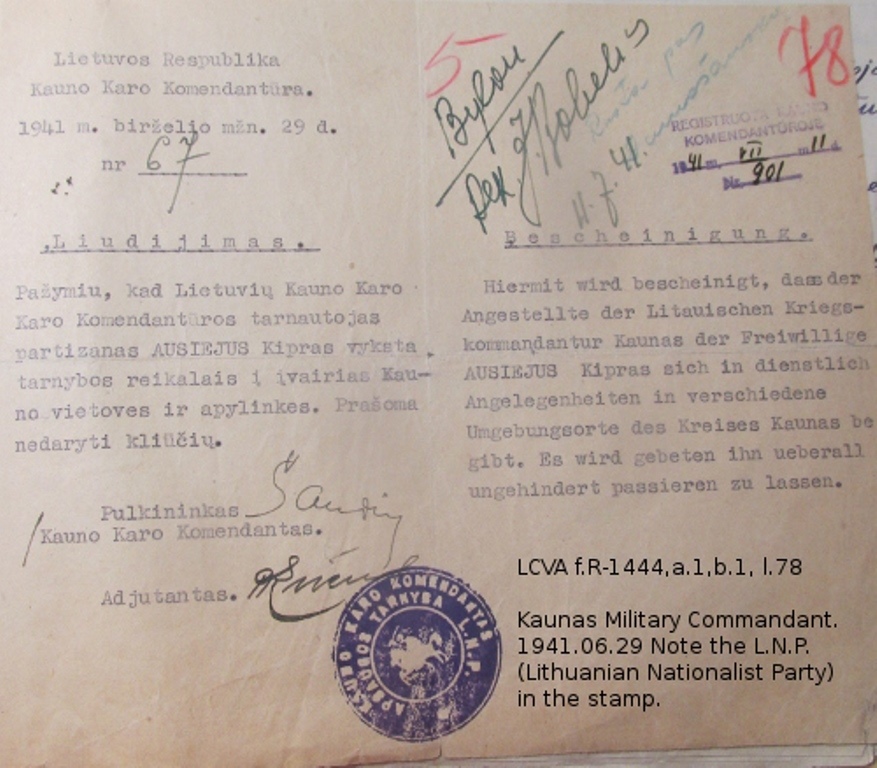
11All documents related to the Lithuanian Nationalist Party, which the Voldemarists created in their efforts to collaborate with Nazi Germany. Saulius Sužiedėlis has branded the LNP as “an organized gang of criminals”. I note that Jonas Noreika was the leader of the LNP for all of Žemaitija. The Lithuanian Special Archives have granted me permission to publish:
- LYA, f.3377, ap.55, b.36 (43 MB) Lithuanian Nationalist Party activity in bourgeois Lithuania.
- LYA, f.3377, ap.55, b.37 (41 MB) The Lithuanian Nationalist Party’s relations with other bourgeois nationalist organizations from 1927 to 1946.
- LYA, f.3377, ap.55, b.38 (49 MB) Lithuanian Nationalist Party activity during the Hitlerist occupation.
◊
12Video and written testimony of Litvaks and others collected by Dovid Katz, the United States Holocaust Memorial Museum and others. In particular, Riva Lozansky’s memoir should be published in Lithuanian.
◊
13Documents by Mykolas Krupavičius of VLIKas (the Supreme Committee for the Liberation of Lithuania) should also be published for context:
◊◊
- His much acclaimed protest letter with Kazys Grinius and Jonas Pranas Aleksa in 1942 which actually contains only half a sentence against the Holocaust, by way of an aside: The Lithuanian nation cannot approve of such means, just as it does not approve of the means taken against Lithuania’s Jews.
- His Pro Memoria regarding his November 29, 1945 meeting with the Jewish committee in Munich shows a missed opportunity for Lithuanians to repair relations with the few surviving Lithuanian Jews by turning in alleged war criminals. The document is archived at the Lithuanian Emigration Institute.
- His assurance that Holocaust criminals would be brought to justice in a free and independent Lithuania: Lietuva, atgavusi savo nepriklausomybę, teisingumo organų keliu jiems atiduos tai, ko jie savo darbais yra nusipelnę.
◊
14The history of distortion by Lithuanian activists (as well as by the Soviets) and its uncovering should be exhaustively documented.
◊
- The page shown above is from a manuscript archived at Lithuania’s national Mažvydas library. It is part of the LAF program which Kazys Škirpa included in “Sukiliminės vyriausybės genezė”, a long article for the Lithuanian-Canadian weekly “Nepriklausoma Lietuva” which began July 26, 1951. The editor Jonas Kardelis returned the manuscript in 1955. The letters “LAF” are in Škirpa’s handwriting. The infamous 16th article of the LAF program, revoking hospitality to the Jews, has been crossed out and the subsequent articles have all been renumbered. Jolita Steponaitienė kindly allowed me to go through the yet-to-be-catalogued Kazys Škirpa archive at the Mažvydas Library and provided me a photocopy of Kardelis’s letter and part of Škirpa’s manuscript.
- The Lithuanian Emigration Institute includes a letter from Stasys Yla to Juozas Girnius in 1979:
You have probably heard and perhaps read of what kind of history K. Škirpa included me in his “Uprising”. I am made out as one of the first participants of LAF when nothing such was the case. It’s good that I have letters which we exchanged before his book came out. Perhaps one day I will publish them and society will see that it is an unbelievable use of my name solely because along with all the rest there needed to be “and one priest”. (LII F.8, Ap.1-7, B.19)
- The revelation by Saulius Sužiedėlis in a three-part interview in Akiračiai in 1991-1992 about such deceptions by Škirpa, Ambrazevičius-Brazaitis and others.
- The outrageous protests in 1995 by Bronys Raila, Mykolas Naujokaitis, Liudas Reivydas and Pilypas Narutis that the LAF documents published in Laisvės kovų archyvas were, in Raila’s words, “probably the work of Soviet or some sort of Semitic provocateurs”.
◊
15In general, the way that Lithuania’s anti-Soviet rebellion has been viewed differently over time should be documented.
◊
- Bronys Raila and Jurgis Valiulis in 1946 wrote critically of LAF-in-Kaunas and the Provisional Government as a Christian Democratic clique unlike the nonpartisan LAF-in-Berlin. They also wrote critically of those who gave in to the false choice of Soviet or Nazi propaganda rather than hold true to the “third way” of democracy!
- Kazys Škirpa was invited to speak in 1956 on Lithuania’s Independence Day in Detroit not as Lithuania’s former Prime Minister but simply as a representative of the Santarieciai-Liaudininkai movement. Similarly, he chose to describe himself as the First Volunteer in Lithuania’s War of Independence of 1918-1920. His speech contrasts his strategy of self-organized volunteers with the Voldemarinkai’s policy of strict vetting.
- The idea that the 1941 anti-Soviet rebellion had lasting significance as regards Lithuania’s self-determination seems to have developed through the journal Į Laisvę, founded in 1953 with editor Juozas Brazaitis, whose articles are available through epaveldas.lt. Here is a collection of articles with historical source material (85 MB).
◊
16Liudas Truska in his history Lietuvių ir žydų santykiai (34 MB) details the broad support which Lithuanian leaders, organizations and ordinary people initially showed for the pro-Soviet government led by Justas Paleckis. He refers to Lietuvos aidas on June 19-21, 1940 for articles on greetings offered by the Seimas Presidium, the army, the Šauliai (riflemen), Savanoriai (volunteer soldiers), Kūrėjai (veterans of the Wars of Independence), a delegation of cooperatives such as Lietūkis, the leadership of the Christian Democrats and the Social Democrats, the Catholic Youth Federation “Pavasaris” (see Lietuvos žinios, June 25, 1940), and the Lithuanian trade association (see Verslas, June 21, 1940). Truska notes that not a single Jewish organization was among those which greeted Paleckis. Truska argues that this broad based embrace by Lithuanians became a source of great shame for which the blame was left on the Jews.
◊
17Lithuanians conspired against Jews. Did Jews conspire against Lithuanians? The conceit that “Lithuanians retaliated against Jews” should be exhaustively sourced and documented to show it for the myth that it is. An ongoing record of antisemitic provocations should be publicly collected so that we could compare, for example, Bronys Raila’s unapologetic, implicit question, Why have the Jews never apologized to us? in his 1995 classic “What Is Always Forgotten About the Relations Between Lithuania’s Jews and Lithuanians? Two Holocausts”, with the very same question as asked explicitly by Eglė Wittig-Marcinkevičiūtė in the September 2015 issue of Kultūros barai.
◊
18Digital copies should be made of boxes 3, 5, 20 and 21 in the Škirpa archive at the American Lithuanian Cultural archives in Putnam, Connecticut. His two grandchildren should be contacted to ask if they have any of his papers. Similarly the Reivytis, Matulionis and other families should be contacted.
◊
19The Einsatzgruppen Operational Situations Reports are a key testimony as to Nazi Germany’s execution of the Holocaust in Lithuania.
◊
20Lithuanian historians should visit the Nazi archives in Ludwigsburg, Germany to find documents related to the Voldemarists, the Lithuanian Activist Front and their Nazi German contacts, especially Heinz Graefe, Peter Kleist, Kurt Graebe, Richard Schweizer and Martin Kurmies.
◊
ACNKOWLEDGMENTS
Thank you to the Lithuanian Central State Archives (LCVA), Lithuania Special Archives (LYA), Lithuanian Emigration Institute (LII), Martynas Mažvydas National Library of Lithuania (Mažvydas) and the Wroblewski Library of the Lithuanian Academy of Sciences (MAB) for making documents available and for permissions granted to publish them online. I have made an effort to name the files so that the originals can be found in the archives. This article is in the Public Domain, copyright-free, for you to share and use in your own best judgment.
◊
